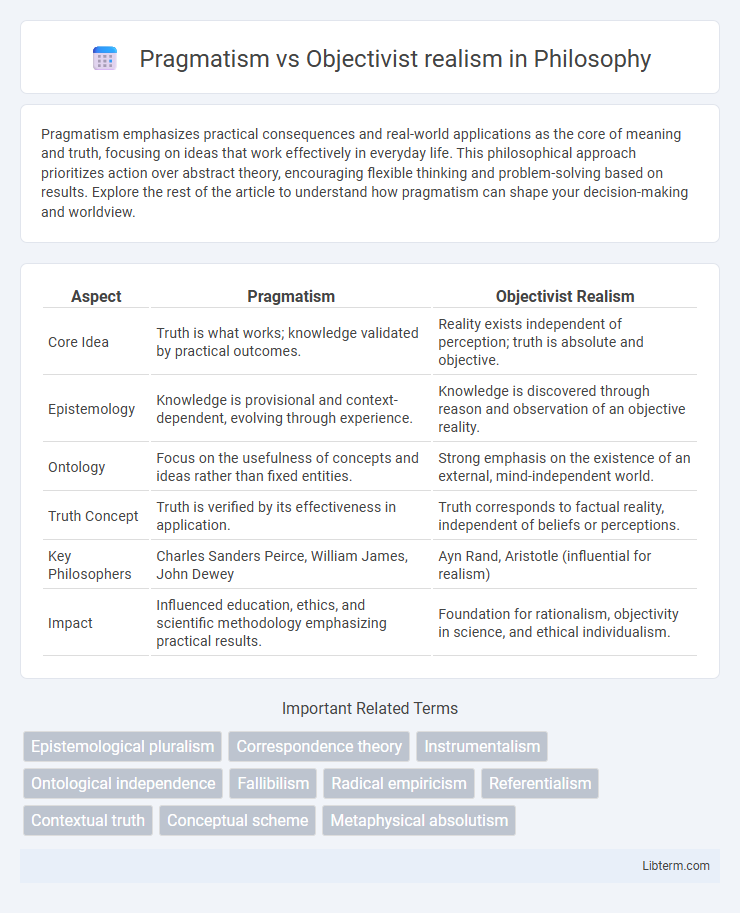Pragmatism emphasizes practical consequences and real-world applications as the core of meaning and truth, focusing on ideas that work effectively in everyday life. This philosophical approach prioritizes action over abstract theory, encouraging flexible thinking and problem-solving based on results. Explore the rest of the article to understand how pragmatism can shape your decision-making and worldview.
Table of Comparison
| Aspect | Pragmatism | Objectivist Realism |
|---|---|---|
| Core Idea | Truth is what works; knowledge validated by practical outcomes. | Reality exists independent of perception; truth is absolute and objective. |
| Epistemology | Knowledge is provisional and context-dependent, evolving through experience. | Knowledge is discovered through reason and observation of an objective reality. |
| Ontology | Focus on the usefulness of concepts and ideas rather than fixed entities. | Strong emphasis on the existence of an external, mind-independent world. |
| Truth Concept | Truth is verified by its effectiveness in application. | Truth corresponds to factual reality, independent of beliefs or perceptions. |
| Key Philosophers | Charles Sanders Peirce, William James, John Dewey | Ayn Rand, Aristotle (influential for realism) |
| Impact | Influenced education, ethics, and scientific methodology emphasizing practical results. | Foundation for rationalism, objectivity in science, and ethical individualism. |
Introduction to Pragmatism and Objectivist Realism
Pragmatism emphasizes knowledge as a tool for practical action and truth as what works in specific contexts, prioritizing human experience and adaptability in problem-solving. Objectivist realism asserts that reality exists independently of human perception, with objective truths discoverable through reason and empirical evidence. These contrasting views frame debates in philosophy regarding the nature of truth, knowledge, and the relationship between mind and reality.
Historical Background and Philosophical Roots
Pragmatism emerged in the late 19th century through thinkers like Charles Sanders Peirce and William James, emphasizing practical consequences and experiential verification as the basis of meaning and truth. Objectivist realism, influenced by Aristotle and developed further by Ayn Rand, asserts the existence of an objective reality independent of perception, grounded in reason and logic. Both philosophies address the nature of truth and knowledge but diverge on the role of human experience versus objective facts in shaping understanding.
Core Principles of Pragmatism
Pragmatism emphasizes the practical consequences and usefulness of beliefs as the core criterion for truth, prioritizing experience and action over abstract absolutes. It asserts that knowledge is inherently fallible and shaped by interaction with the environment, promoting adaptability and problem-solving in real-world contexts. Unlike Objectivist realism, which upholds an independent, mind-exterior reality governed by fixed, objective facts, pragmatism views truth as dynamic and evolving based on human purposes and outcomes.
Foundational Tenets of Objectivist Realism
Objectivist Realism asserts that reality exists independently of consciousness, emphasizing an objective world that can be known through reason and empirical evidence. Foundational tenets include the correspondence theory of truth, where ideas must align with observed facts, and the rejection of subjective interpretation in favor of objective, rational analysis. This philosophical stance contrasts with Pragmatism's focus on practical consequences and utility as criteria for truth, prioritizing reality's fixed nature and knowability through logic.
Truth and Reality: Contrasting Perspectives
Pragmatism defines truth as what works effectively in practical contexts, emphasizing outcomes and usefulness over absolute certainty, while Objectivist realism asserts that truth exists independently of human perception, rooted in an objective reality discoverable through reason and evidence. Pragmatists view reality as dynamic and constantly interpreted through experience, whereas Objectivist realists maintain that reality is fixed, governed by natural laws regardless of individual beliefs. This fundamental divergence highlights pragmatism's focus on the adaptive function of truth versus objectivist realism's commitment to an immutable, mind-independent world.
Methods of Knowledge Acquisition
Pragmatism emphasizes knowledge acquisition through practical engagement, experience, and adaptive problem-solving, valuing outcomes and usefulness in shaping truth. Objectivist realism asserts that knowledge is obtained by observing objective reality directly and adhering to logical reasoning, independent of personal feelings or social influences. While pragmatism prioritizes flexible, context-driven inquiry, objectivist realism relies on consistent, empirical evidence to arrive at universal truths.
Practical Implications in Contemporary Philosophy
Pragmatism emphasizes the practical consequences of beliefs and theories, asserting that truth is verified through effective action and problem-solving in real-world contexts. Objectivist realism, rooted in the philosophy of Ayn Rand, holds that objective reality exists independently of perceptions, and knowledge must align with that reality through reason, influencing ethical and political decision-making grounded in factual evidence. Contemporary philosophy debates between these perspectives shape approaches in epistemology, ethics, and science, particularly regarding how humans derive meaning and make decisions to achieve practical and moral outcomes.
Critiques and Counterarguments
Pragmatism faces critiques for its emphasis on practical consequences, which some argue undermines objective truth by prioritizing usefulness over factual accuracy. Objectivist realism counters by asserting the existence of an observer-independent reality that truth must correspond to, rejecting relativism inherent in pragmatism. Critics of objectivist realism highlight its potential rigidity and failure to account for the evolving nature of knowledge, while pragmatists emphasize adaptability and context in understanding truth.
Key Thinkers and Influential Works
Pragmatism, with key thinkers like Charles Sanders Peirce, William James, and John Dewey, emphasizes practical consequences and experiences as fundamental to meaning and truth, notably articulated in Peirce's "How to Make Our Ideas Clear" and Dewey's "Experience and Nature." Objectivist realism, championed by Ayn Rand, centers on objective reality existing independent of perceptions, firmly outlined in her influential work "Atlas Shrugged" and essays compiled in "The Virtue of Selfishness." Both philosophies contrast in epistemology and ontology, highlighting pragmatism's fluid truth versus objectivist realism's fixed reality.
Conclusion: Relevance in Modern Discourse
Pragmatism values practical consequences and human experiences as criteria for truth, shaping adaptive and context-sensitive knowledge frameworks. Objectivist realism asserts the independent existence of an objective reality, emphasizing correspondence between beliefs and facts regardless of perception. Their relevance in modern discourse lies in balancing flexible problem-solving approaches with unwavering commitment to factual accuracy, influencing fields from science to ethics.
Pragmatism Infographic

 libterm.com
libterm.com